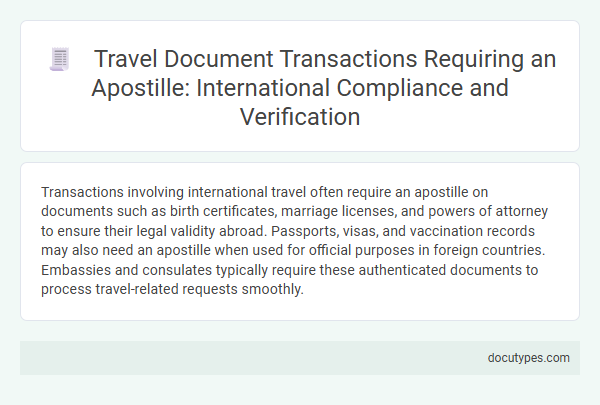Transactions involving international travel often require an apostille on documents such as birth certificates, marriage licenses, and powers of attorney to ensure their legal validity abroad. Passports, visas, and vaccination records may also need an apostille when used for official purposes in foreign countries. Embassies and consulates typically require these authenticated documents to process travel-related requests smoothly.
Understanding Travel Document Transactions
Certain travel document transactions require an apostille to verify authenticity for international use. Understanding which transactions need this certification ensures smoother processing during travel.
- Passport Authentication - Apostilles are needed when verifying passports for visas or foreign residency applications.
- Birth Certificate Validation - Apostilles authenticate birth certificates for citizenship claims or international adoption processes.
- Power of Attorney Verification - Apostilles certify powers of attorney used in international travel arrangements or legal matters abroad.
What Is an Apostille and Why Is It Needed?
An apostille is an official certificate attached to a document to verify its authenticity for international use under the Hague Convention. It ensures that travel documents such as birth certificates, marriage licenses, and power of attorney are recognized by foreign governments. You need an apostille for transactions like visa applications, international adoptions, and business travel permissions where legal validation is required abroad.
Countries Participating in the Hague Apostille Convention
| Type of Transaction | Description | Relevance to Countries in the Hague Apostille Convention |
|---|---|---|
| Visa Applications | Official travel documents such as birth certificates or background checks often require authentication to validate identity and eligibility. | Documents must be apostilled to ensure acceptance by visa authorities in member countries of the Hague Apostille Convention. |
| Travel Consent for Minors | Parental authorization forms for minors traveling internationally need certification to confirm legitimacy. | In Hague Convention countries, an apostille on such consent forms guarantees recognition without further legalization. |
| Academic Transcripts and Diplomas | For educational travel or study abroad programs, academic documents require authentication to confirm validity and status. | Hague apostille facilitates acceptance of these documents among participating nations, streamlining the enrollment process. |
| Marriage and Divorce Certificates | Documents proving marital status are essential for legal or residency purposes during extended travel or relocation. | These certificates must bear an apostille to be legally recognized across member states of the Hague Apostille Convention. |
| Power of Attorney | Delegation of authority for legal or financial matters abroad needs official authentication to be valid. | An apostille ensures member countries accept the power of attorney without additional certification steps. |
| Employment Contracts and Work Permits | Documents related to overseas employment require proof of authenticity to comply with legal regulations. | Countries in the Hague Apostille Convention accept apostilled contracts as valid, expediting the employment process. |
Types of Travel Documents Requiring an Apostille
Travel documents that often require an apostille include birth certificates, marriage certificates, and power of attorney forms. These documents must be authenticated to be legally recognized in foreign countries that are members of the Hague Apostille Convention. Passports and visas typically do not require an apostille but must comply with specific embassy or consulate requirements for international travel.
Steps to Obtain an Apostille for Travel Documents
Travel documents often require an apostille for international use, especially when dealing with visas, passports, and birth certificates. Transactions involving legal proof of identity or authorization in foreign countries frequently demand this certification.
Steps to obtain an apostille for travel documents begin with identifying the competent authority in the document's issuing country. You must submit the original document or a certified copy along with a completed application and applicable fees.
Legalization vs. Apostille: Key Differences
Travel documents often require authentication to be recognized internationally, with apostilles serving as a streamlined form of verification under the Hague Convention. Understanding when to use an apostille versus other legalization methods is crucial for ensuring document validity across borders.
- Apostille Usage - An apostille is required for documents issued in countries that are members of the Hague Apostille Convention, simplifying cross-border recognition.
- Legalization Process - Legalization applies to countries not party to the Hague Convention and involves a more complex authentication through consular services.
- Types of Transactions - Transactions like notarized affidavits, birth certificates, and power of attorney often require apostilles when used abroad for travel-related legal purposes.
Choosing the correct authentication method depends on the destination country's international agreements and the nature of the travel document involved.
International Compliance Standards for Travel Documents
International travel documents often require an apostille to verify their authenticity for use in foreign countries. This certification ensures compliance with the Hague Convention, streamlining cross-border legal processes.
Transactions involving visas, immigration papers, and educational credentials typically necessitate an apostille to meet international compliance standards. Apostilles authenticate birth certificates, marriage licenses, and power of attorney documents for travel purposes. Airlines, consulates, and immigration authorities rely on these verified documents to facilitate lawful entry and residency abroad.
Common Mistakes in Apostille Processing
What types of transactions require an apostille on travel documents? Apostilles are typically needed for international use of birth certificates, marriage certificates, and power of attorney. Common mistakes include submitting documents that are not notarized or using outdated apostille forms.
Document Verification Procedures Abroad
Travel documents often require an apostille to verify their authenticity for use in foreign countries. This process ensures that official papers, such as birth certificates, marriage licenses, and diplomas, are recognized by foreign authorities.
Transactions involving legal matters, property purchases, or business agreements abroad typically necessitate apostilled documents. Your travel plans might also require apostilles for visa applications, residency permits, or employment contracts to meet international document verification procedures.
What Types of Transactions Require an Apostille on Travel Documents? Infographic

